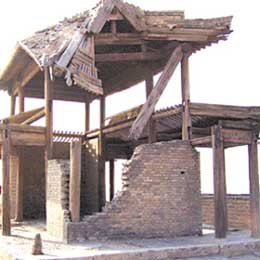
When I called my friends for a weekend trip to Jimingyi, the Cock Crow Post Town, I found myself having to explain to each one in detail the destination, even the name itself.
The post town, in what is now Huailai County, Hebei Province, is the biggest and best preserved ancient postal station in China.
Though it is only two hours' drive away from downtown Beijing, the ancient city remains unknown to many, visited only by a few who are greatly interested in Chinese history and culture.
Long before the information superhighway, China operated a vast network of 1,600 postal stations, referred to as "daks," using thousands of men and horses to link every corner of the sprawling empire with the imperial capital.
The Cock Crow Post Town was established during the Yuan Dynasty (1279-1368) when Kublai Khan was on a western expedition. It was renovated and expanded in 1420 during the reign of Emperor Yongle of the Ming Dynasty (1368-1644).
For almost 600 years, the post town had played a major role in the history of Chinese posts and communications. Messengers carrying imperial documents and vital military intelligence would change horses or rest here overnight. Officials, soldiers and criminals on their journeys between Beijing and the frontier also sought welcome sanctuary within the sturdy city walls.
In 1913 when the northern warlord government decided to eliminate the ancient postal system and replaced it with a modern post office system, the Cock Crow Post Town went into decline.
Given its great age and the lack of conservation, it is surprising how much of the ancient village still stands. The post town still retains its original layout. It is a square-shaped town surrounded by a two-kilometer wall and two gates, one in the east and the other in the west.
The eastern and northern city walls are almost intact, while sections of the western and southern walls have almost disappeared. The once high and magnificent gate towers have become now little more than wooden skeletons pointing to the sky.
From atop the west gate are pretty views to the distant hills and over fields that yield the staples of northern China corn, sunflowers and sorghum.
A local guide showed us around the ancient town, visiting some local dwellings and ancient temples. One was the guide's home welcomed by his lovely pet dog, others include that of the overnight dwelling for Empress Dowager Cixi, who passed through this strategically important post town fleeing the Western allied forces that were attacking Beijing in 1900.
The main attraction is the ancient temples. It is surprising that the small post town is home to eight ancient temples, all in very poor shape though.
Each temple is watched over by local residents, who will unlock the gates for visitors in exchange for a small entry fee. During our visit, the Temple of Eternal Tranquility, which is the oldest with a history of more than 800 years, is under renovation. Its wall paintings from the Ming Dynasty are still complete and fresh in color. Baby dolls made by pious followers are also found on the table behind the shrine. According to the guide, the temple is still worshipped by many for baby births.
The name of the town actually originated from the temples, said the guide. It is a long story, but basically it is because worshippers brought cocks to the temples as an appreciation for the blessing they'd got. The monks, eating no flesh, set the cocks free in the mountain in the north.
For years early in the morning, the mountain was echoed by cock crowing. Thus the locals started to refer the mountain as Jimingshan (Cock Crow Mountain), and the town Cock Crow Post Town.
The guide had quite a few more interesting historical anecdotes and local folklores. It is worthwhile to hire one (20 yuan/US$2.41) if you can understand Chinese.
If not, a casual stroll in the ancient town along the grit-covered thoroughfare connecting the east and west gates is also interesting if you would like to experience something ancient and a bit different to the modern amenities of Beijing.
About 1,000 people still live there in traditional brick and earth houses, many of which are courtyard dwellings of considerable age. Each morning and evening the famers passed through the ancient gates with their tools, horse drawn carts, cows, sheep, the odd motorbike and small tractors.
Sometimes you wonder how the prosperous commercialism has escaped this ancient town that used to be a business hub 200 years ago. It is even hard to find a convenience store to buy a bottle of water, so bring your own.
Three hours is enough at the post town, especially if you opt for another destination that day. Another ancient city called Xuanhua is about 30 minutes drive away further along the Beijing-Zhangjiakou Expressway. It was one of the major defence cities on the northern border, also walled and complete with a whole system of defence capacities.
The Guanting Reservoir on the way back is also recommended if you have enough time and want a breath of fresh air.
How to get there: Take the train at Yongdingmen Railway Station in the south of Beijing and get off at Shacheng, where you can take a local bus to Cock Crow Post Town (30 minutes). By car, take the Beijing-Badaling-Zhangjiakou Expressway and look for the exit sign for Jimingyi. It is a 150-kilometer drive.
(China Daily November 25, 2005)
|

